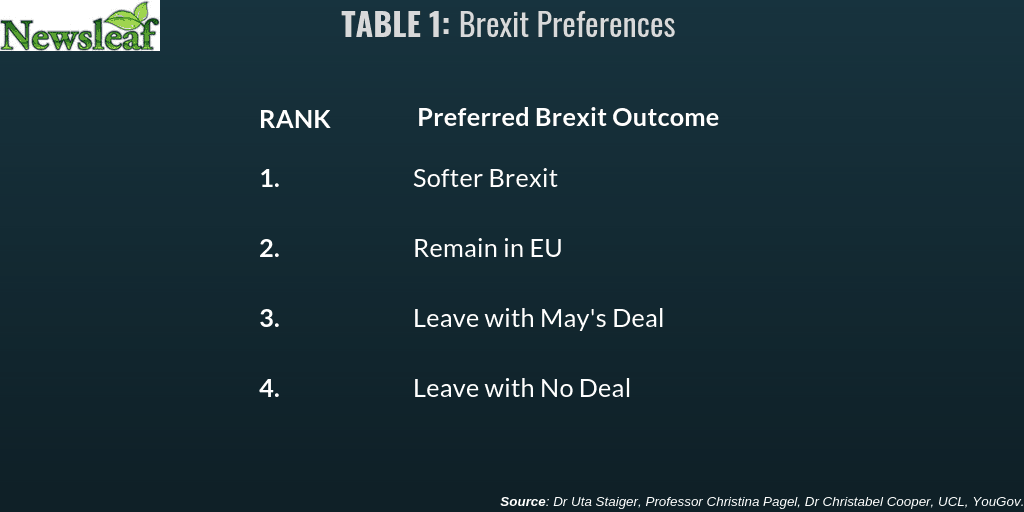Widget not in any sidebars
The issue of a second referendum is ground well-trodden, however, the recent collapse of cross-party Brexit talks and the bad faith which continues to dominate the debate over a confirmatory vote makes it impossible not to correct the record.
Firstly, I must challenge the language commonly used by Brexiteers. The ‘People’s Vote’ or ‘Confirmatory Vote’ as it has recently been referred to, is in fact not a second referendum on EU membership, but the opportunity for the country to select what Brexit really means.
This may sound finicky or misleading to anyone who follows the Farage-Johnson line on the issue, but the premise of another vote is not to re-run 2016 in the hope of a different outcome, but rather to gain greater clarity on the Brexit process.
One of the primary reasons for the ongoing deadlock in parliament is the myriad ways in which the 2016 result can be interpreted. By Theresa May’s interpretation the UK should remove itself from the excessive bureaucracy of the EU, but remain tied to the single market (based on polling this seems the most accurate interpretation), however, those to the right of her believe only total removal from the institutions of the European Union will correctly carry out the will of the people.
Given such wildly different interpretations, it is impossible for any consensus to be had within parliament, as Jacob Rees-Mogg and Boris Johnson can claim that their constituents will be let down by anything short of total separation and there is no way of conclusively disproving this claim, making it therefore impossible to whip their vote in favour of a deal.
Thus, a confirmatory vote, based on whatever deal is put forward provides a clear solution to the current deadlock. Arguments that this is wasteful and provide no guarantee of a clear answer carry some merit, but these arguments are not put forward. Instead the debate is muddied by bad faith arguments aimed at polluting the discourse, shutting down debate over a potential solution, simply because it threatens the political aims of those Brexiteers pushing for a more extreme version of Brexit.
Based on polling, a softer Brexit – one where the UK remains in the single market – is the prevailing solution (as illustrated in Table 1 below). However, most of those putting forward arguments against the confirmatory vote are to the extreme of this, suggesting their bad faith arguments are borne out of panic that the public would not gift them the outcome they desire.

The willingness of the Conservatives to sacrifice 6 weeks of negotiations over this issue acts as notable proof; backbench members of the Conservatives strong arming the prime minister into this position, preventing a cross party solution for fear of surrendering their personal grip on power.
The most common fallacy put forward against this argument is that it is anti-democratic. This clearly makes no sense, since 1997 the UK has held a general election at an average interval of 4 years, with the last election occurring just two years after the previous. Given the referendum was now three years ago, stating another vote is undemocratic is like calling a general election a crisis for democracy. As argued by academics, such as Ben Williams of the University of Salford, circumstances have changed since 2016. People have different information and they have a right to have another say.
This is true, but largely unnecessary as an argument by playing into the Brexiteer framing of this referendum as a re-run. Such an argument is not necessary given that the confirmatory vote is aimed at, as the name suggests, confirming support for the deal rather than whether the country still wants to leave the EU. It is to break the deadlock and allow people to decide whether they are happy with the deal or want a different outcome.
The major reason for the falsehoods surrounding another referendum is the lack of a clear vision on what this would look like. Some vague assertions have been made about the framing of the question. Without a clear plan, however, it’s relatively easy for the debate to be manipulated and for falsehoods to prevail.
A confirmatory vote must take the shape of a list system, allowing a plethora of options to be considered and allowing for a majority to prevail. A list which must include:
- accepting the negotiated deal,
- sending the government back to Brussels,
- leaving with no deal; and,
- remaining in the EU should all be placed on the ballot.
List voting allows that those with the fewest votes can have the second preferences allocated to other outcomes, allowing one to gain a majority, thus ending the deadlock.
This provides a clear way forward for the government, with the majority option providing a solution for the current deadlock. This is perhaps a manipulative way of securing a majority – arrow theorem largely shows the problems of this system – but in any meaningful way, it does provide a solution to the current deadlock.
With the government’s position weakening the longer the negotiations drag on, a quick solution is the best option for the United Kingdom and with the parliamentary arithmetic as it is, this is the only way to go.
This methodology has been questioned by academics who suggest that the by subscribing to majoritarian democracy, we are in fact threatening the very parliamentary tradition, based on the trustee model of representation – whereby politicians are largely entrusted to make key decisions on our behalf.
Yet, given the last few years of parliamentary discourse, I ask what a bigger threat is, majoritarian outcomes, or the crisis of confidence that the ongoing Brexit discussion causes.
Democracy, in practise, always seeks to be a majoritarian game, a referendum seeking such an outcome is far less threatening to our system of government than the current Brexit process.
If you are a Brexiteer, I would encourage you to challenge the talking points from the leadership of this position. A second referendum is not anti-democratic, it is not an attempt to overturn the result of the prior vote; it is a clear way forward. The only way that we can reassert confidence in our system of government and end the deadlock which continues to damage our economy and leave millions of British people (and residents alike) in a precarious position.
He may vehemently attack the idea of a confirmatory vote today, but I sign of the article with a quote from the Brexit Party’s Nigel Farage: ‘maybe, just maybe, we should have a second referendum‘.
______________________________________________________________________________
Calum Paton is a History and Politics student at the University of Warwick. His writing focuses on American and British politics. Twitter: @Paton_Calum




